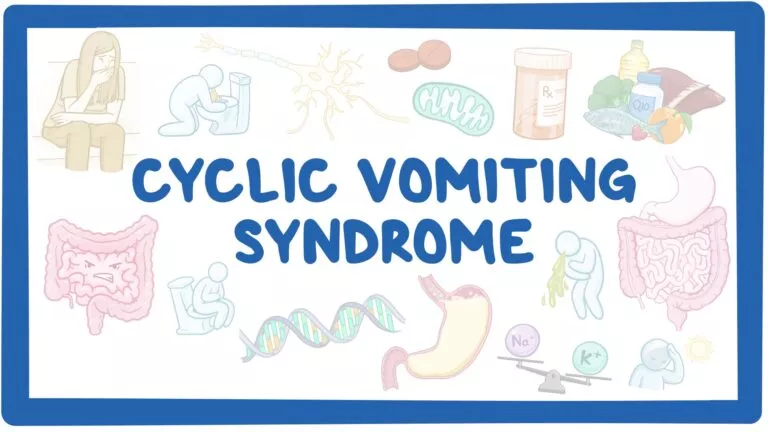WHAT IS CYCLIC VOMITING SYNDROME?
Cyclic vomiting syndrome is characterized by episodes of severe vomiting that do not have an apparent cause. Episodes could last for hours or days and alternate with symptom-free periods. Episodes are similar, meaning that they tend to begin at the same time of day, last the same length of time, and occur with the same symptoms and intensity.
Cyclic vomiting syndrome occurs in all age groups, though it often starts in children around 3 to 7 years old. Although it is more common in children, the number of cases diagnosed in adults is rising.
The syndrome is hard to diagnose because vomiting is a symptom of many disorders. Treatment often involves lifestyle changes to help prevent the events that could trigger vomiting episodes. Medications, including anti-nausea and migraine therapies, might help lessen symptoms.
CYCLIC VOMITING SYNDROME SYMPTOMS
The symptoms of cyclic vomiting syndrome often start in the morning. Signs and symptoms include:
- Three or more recurrent episodes of vomiting that begin around the same time and last for a similar length of time
- Varying intervals of usually normal health without nausea between episodes
- Intense nausea and sweating before an episode begin
Other signs and symptoms during a vomiting episode might include:
- Abdominal pain
- Diarrhea
- Dizziness
- Sensitivity to light
- Headache
- Retching or gagging
WHEN SHOULD YOU SEE A DOCTOR?
Contact your doctor if you notice blood in your or your child’s vomit.
Continued vomiting might cause severe dehydration which can be life-threatening. Contact your doctor if you or your child is showing symptoms of dehydration, such as:
- Excess thirst or dry mouth
- Less urination
- Dry skin
- Sunken eyes or cheeks
- No tears when crying
- Exhaustion and listlessness
CYCLIC VOMITING SYNDROME CAUSES
The underlying cause of cyclic vomiting syndrome is not known. Some possible causes include genes, digestive difficulties, nervous system issues, and hormone imbalances. Specific bouts of vomiting might be triggered by:
- Colds, allergies, and sinus problems
- Emotional stress or excitement, particularly in children
- Anxiety or panic attacks, particularly in adults
- Certain foods and drinks, like alcohol, caffeine, chocolate, or cheese
- Overeating, eating just before going to bed or fasting
- Hot weather
- Physical exhaustion
- Exercising too much
- Menstruation
- Motion sickness
Identifying the triggers for vomiting episodes might help with managing cyclic vomiting syndrome.
CYCLIC VOMITING SYNDROME RISK FACTORS
The connection between migraines and cyclic vomiting syndrome is unclear. But many children with cyclic vomiting syndrome have a family history of migraines or have migraines themselves when they grow older. In adults, cyclic vomiting syndrome is also related to a personal or family history of migraines.
Chronic use of marijuana (Cannabis sativa) also has been related to cyclic vomiting syndrome because some people use marijuana to relieve their nausea. However, chronic marijuana use can lead to a condition known as cannabis hyperemesis syndrome, which typically leads to persistent vomiting without normal intervening periods. People with this syndrome usually demonstrate frequent showering or bathing behavior.
Cannabis hyperemesis syndrome could be confused with cyclic vomiting syndrome. To rule out cannabis hyperemesis syndrome, you need to stop using marijuana for at least one to two weeks to see if vomiting is reduced. If it does not, your doctor will continue testing for cyclic vomiting syndrome.
CYCLIC VOMITING SYNDROME COMPLICATIONS
Cyclic vomiting syndrome could cause these complications:
- Dehydration – Excessive vomiting causes the body to lose water rapidly. Severe cases of dehydration might need to be treated in the hospital.
- Injury to the food tube – The stomach acid that comes up with the vomit could damage the tube that connects the mouth and stomach (esophagus). Sometimes the esophagus gets so irritated it bleeds.
- Tooth decay – The acid in vomit could corrode tooth enamel.
CYCLIC VOMITING SYNDROME PREVENTION
Many people are aware of what triggers their cyclic vomiting episodes. Avoiding those triggers could reduce the frequency of episodes. While you might feel well between episodes, it is very important to take medications as prescribed by your doctor.
If episodes occur more than once a month or require hospitalization, your doctor might recommend preventive medicine, such as amitriptyline, propranolol (Inderal), cyproheptadine, and topiramate.
Lifestyle changes also might help, including:
- Getting adequate sleep
- For children, downplaying the importance of upcoming events because of excitement could be a trigger
- Avoiding trigger foods, like alcohol, caffeine, cheese, and chocolate
- Eating small meals and low-fat snacks every day at regular times
CYCLIC VOMITING SYNDROME DIAGNOSIS
Cyclic vomiting syndrome could be difficult to diagnose. There is no specific test to confirm the diagnosis, and vomiting is a sign of many conditions that must be ruled out first.
The doctor will start by asking about your child’s or your medical history and conducting a physical examination. The doctor will also want to know about the pattern of symptoms that you or your child is experiencing.
After that, the doctor might recommend:
- Imaging studies — like endoscopy, ultrasound, or a CT scan — to check for blockages in the digestive system or signs of other digestive conditions
- Motility tests to monitor the movement of food via the digestive system and to check for digestive disorders
- Laboratory tests to look at thyroid problems and other metabolic conditions
CYCLIC VOMITING SYNDROME TREATMENT
There is no cure for cyclic vomiting syndrome, though many children no longer have vomiting episodes by the time they reach adulthood. For those experiencing a cyclic vomiting episode, treatment concentrates on controlling the signs and symptoms.
You or your child might be prescribed:
- Anti-nausea drugs
- Pain-relieving medications
- Medications that suppress stomach acid
- Antidepressants
- Anti-seizure medications
The same types of medications used for migraines could sometimes help stop or even prevent episodes of cyclic vomiting. These medications might be recommended for people whose episodes are frequent and long-lasting, or for people with a family history of migraine.
IV fluids might need to be given to prevent dehydration. Treatment is customized based on the severity and duration of symptoms as well as the presence of complications.
If you or anyone you know is suffering from cyclic vomiting syndrome, our expert providers at Specialty Care Clinics will take care of your health and help you recover.
Call 469-545-9983 to book a telehealth appointment for an at-home check-up.




